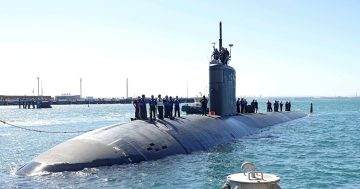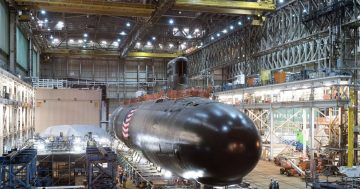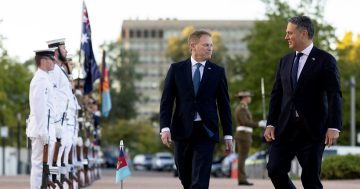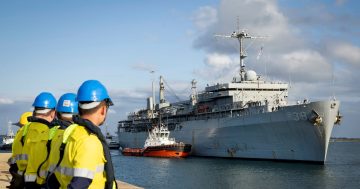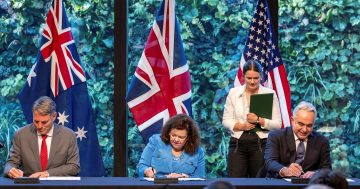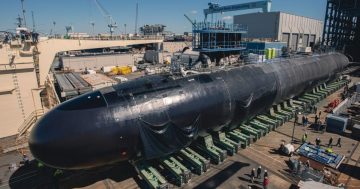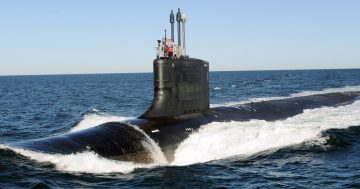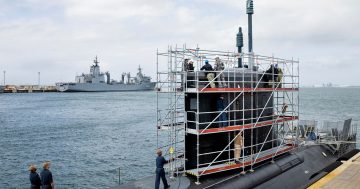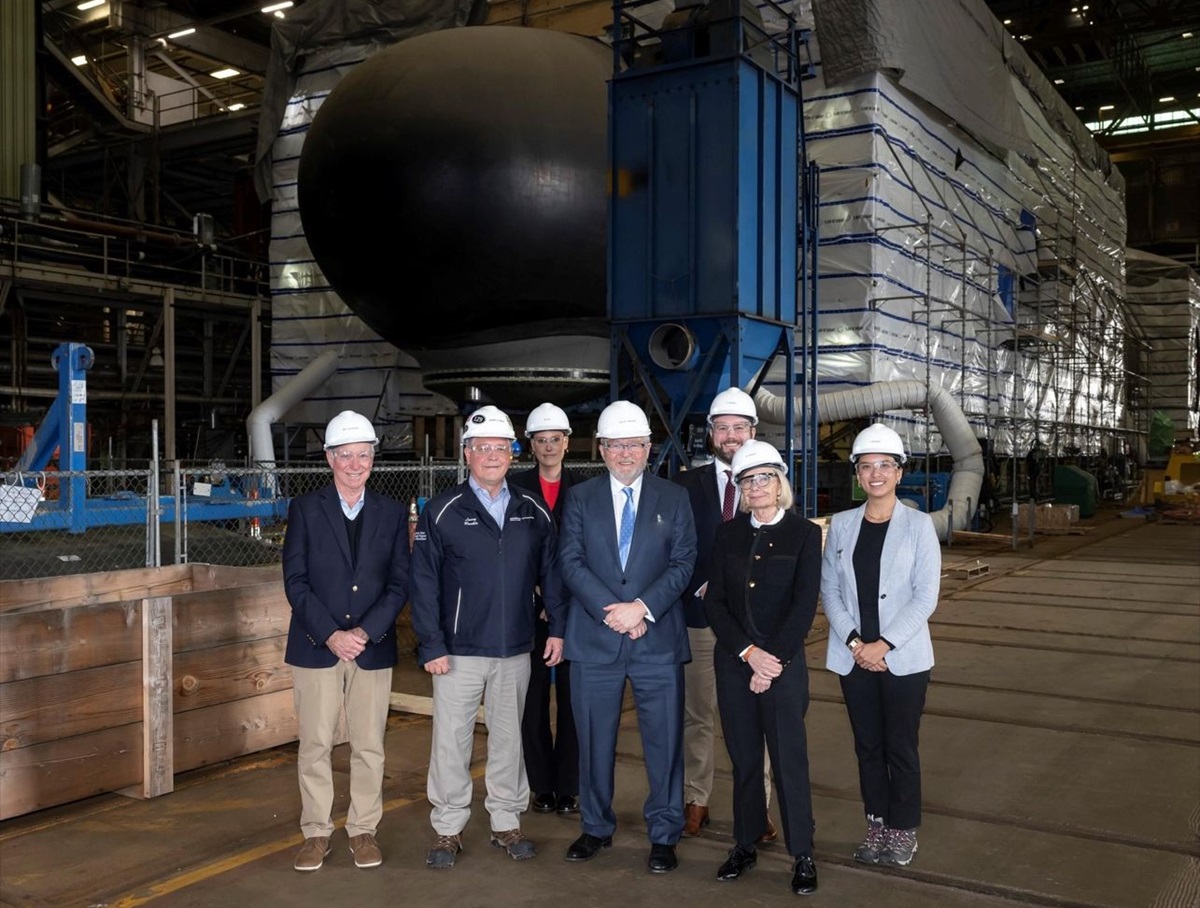
Democratic Senator Joe Courtney (left) and Australian Ambassador to the US Kevin Rudd (centre) at the General Dynamics Electric Boat shipyard in Groton, Connecticut. Photo: Senator Courtney LinkedIn.
The US Congress is set to approve the 2024 National Defense Authorization Act (NDAA) this week, green-lighting the transfer of at least two Virginia-class nuclear-powered submarines to the Royal Australian Navy.
After months of wrangling, the $US874.2 billion ($A1.324 trillion) bill will put into US law the AUKUS Pillar 1 agreement between Australia, the UK and the US. It will also clear the way for a $US 3bn ($A 4.5 billion) investment by the Australian Government in US shipyards to expand their submarine manufacturing capacity and the release of sensitive US technologies to Australia.
The bill still needs to be voted on by Congress, but apart from pushback by the Republican ‘Freedom Caucus’, which has seen many of its proposed amendments unrelated to AUKUS removed, passing the largely bipartisan bill is expected to be a formality and completed before Congress rises for the Christmas break.
Importantly, the bill includes four key authorisations that are needed to enact the AUKUS agreement into law.
These include more time to approve a ”defense supplemental spending request’’ required to expand US submarine production capacity; the acceptance of the $US3 billion payment from Australia, allowing Australian industry personnel to train on the maintenance and use of nuclear-powered submarines; and an exemption for Australia and the UK from the US export control regimen if both countries develop comparable laws of their own.
That last authorisation will not only cover the nuclear reactors and other systems for Australia’s submarines but also a large number of technologies that will be required to develop many of the planned AUKUS Pillar 2 capabilities, including cyber, quantum computing, autonomous systems, artificial intelligence, space-based capabilities and hypersonics.
The bill will also give Australian and British companies access to US federal grants under the Defense Production Act.
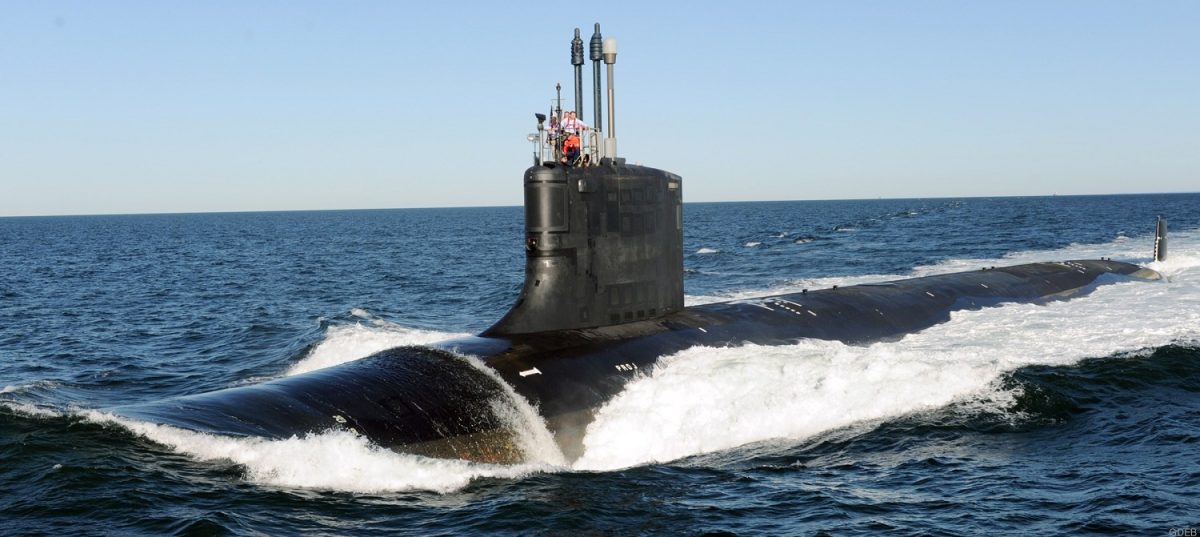
The bill will allow the transfer of two former US Navy Virginia-class submarines to Australia in 2032 and 2035, and the sale of a third new-build boat in 2038. Photo: US Navy.
Joe Courtney, US Democratic Senator for Connecticut – a state that is home to one of the US’s two nuclear submarine shipyards – said the bill advanced the AUKUS trilateral security agreement.
“For the first time since the launch of the [first nuclear-powered submarine) USS Nautilus in 1958, this NDAA authorises the US Navy to sell three conventionally armed, nuclear-powered submarines to another nation – our steadfast ally Australia,” Senator Courtney said.
“In addition, it streamlines technology sharing among the three AUKUS allies under the umbrella of the Defense Production Act to strengthen deterrence in the Indo-Pacific.
“Lastly, it includes authority for the Navy to purchase up to 13 Virginia-class submarines in the next block contract, which will guarantee a steady demand to boost production capacity and thus meet our fleet requirements.
“I thank leaders of the Armed Services and Foreign Affairs committees, as well as Australian Ambassador Kevin Rudd and UK Ambassador Dame Karen Pierce, for their advocacy and unwavering support of my efforts to see these provisions included in the final FY24 NDAA.
“I urge my colleagues to join me in voting for this bill on the House floor and sending it to the President’s desk for the 63rd consecutive year.”
Republican Senator for Mississippi and ranking member of the Senate Armed Services Committee, Senator Roger Wicker, who had been holding out on the bill, expressed his support for the AUKUS agreement.
“I appreciate that much important work of implementing AUKUS can now begin, including Australian contractor training and the crucial sharing of advanced technology under Pillar 2,” he said.
“Congress now must act quickly on the supplemental funding for the US submarine industrial base. Our defence industrial base is already behind where it needs to be. We are producing about 1.2 attack submarines a year rather than the 2.3 necessary to fulfil the AUKUS agreement and meet US requirements.”
Original Article published by Andrew McLaughlin on Riotact.


